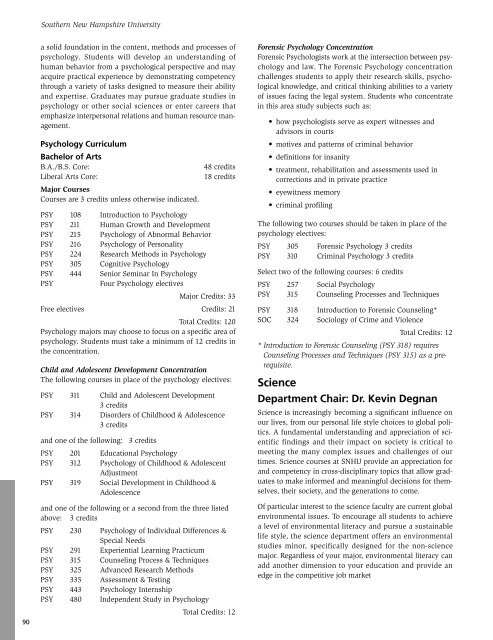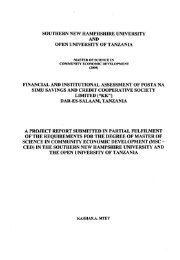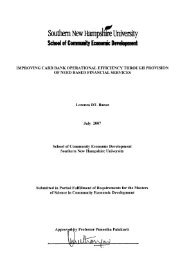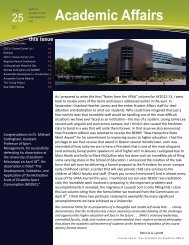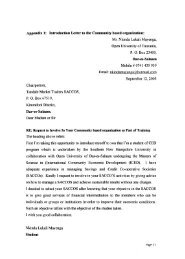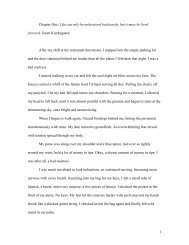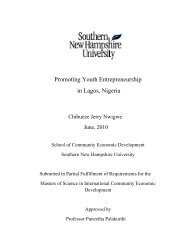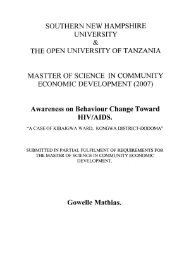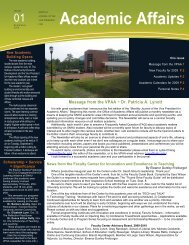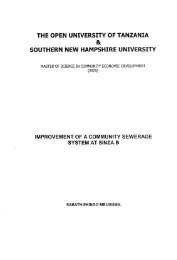Undergraduate Catalog 2010-2011 - SNHU Academic Archive ...
Undergraduate Catalog 2010-2011 - SNHU Academic Archive ...
Undergraduate Catalog 2010-2011 - SNHU Academic Archive ...
Create successful ePaper yourself
Turn your PDF publications into a flip-book with our unique Google optimized e-Paper software.
Southern New Hampshire University<br />
90<br />
a solid foundation in the content, methods and processes of<br />
psychology. Students will develop an understanding of<br />
human behavior from a psychological perspective and may<br />
acquire practical experience by demonstrating competency<br />
through a variety of tasks designed to measure their ability<br />
and expertise. Graduates may pursue graduate studies in<br />
psychology or other social sciences or enter careers that<br />
emphasize interpersonal relations and human resource management.<br />
Psychology Curriculum<br />
Bachelor of Arts<br />
B.A./B.S. Core:<br />
48 credits<br />
Liberal Arts Core:<br />
18 credits<br />
Major Courses<br />
Courses are 3 credits unless otherwise indicated.<br />
PSY 108 Introduction to Psychology<br />
PSY 211 Human Growth and Development<br />
PSY 215 Psychology of Abnormal Behavior<br />
PSY 216 Psychology of Personality<br />
PSY 224 Research Methods in Psychology<br />
PSY 305 Cognitive Psychology<br />
PSY 444 Senior Seminar In Psychology<br />
PSY<br />
Four Psychology electives<br />
Major Credits: 33<br />
Free electives Credits: 21<br />
Total Credits: 120<br />
Psychology majors may choose to focus on a specific area of<br />
psychology. Students must take a minimum of 12 credits in<br />
the concentration.<br />
Child and Adolescent Development Concentration<br />
The following courses in place of the psychology electives:<br />
PSY 311 Child and Adolescent Development<br />
3 credits<br />
PSY 314 Disorders of Childhood & Adolescence<br />
3 credits<br />
and one of the following: 3 credits<br />
PSY 201 Educational Psychology<br />
PSY 312 Psychology of Childhood & Adolescent<br />
Adjustment<br />
PSY 319 Social Development in Childhood &<br />
Adolescence<br />
and one of the following or a second from the three listed<br />
above: 3 credits<br />
PSY 230 Psychology of Individual Differences &<br />
Special Needs<br />
PSY 291 Experiential Learning Practicum<br />
PSY 315 Counseling Process & Techniques<br />
PSY 325 Advanced Research Methods<br />
PSY 335 Assessment & Testing<br />
PSY 443 Psychology Internship<br />
PSY 480 Independent Study in Psychology<br />
Total Credits: 12<br />
Forensic Psychology Concentration<br />
Forensic Psychologists work at the intersection between psychology<br />
and law. The Forensic Psychology concentration<br />
challenges students to apply their research skills, psychological<br />
knowledge, and critical thinking abilities to a variety<br />
of issues facing the legal system. Students who concentrate<br />
in this area study subjects such as:<br />
• how psychologists serve as expert witnesses and<br />
advisors in courts<br />
• motives and patterns of criminal behavior<br />
• definitions for insanity<br />
• treatment, rehabilitation and assessments used in<br />
corrections and in private practice<br />
• eyewitness memory<br />
• criminal profiling<br />
The following two courses should be taken in place of the<br />
psychology electives:<br />
PSY 305 Forensic Psychology 3 credits<br />
PSY 310 Criminal Psychology 3 credits<br />
Select two of the following courses: 6 credits<br />
PSY 257 Social Psychology<br />
PSY 315 Counseling Processes and Techniques<br />
PSY 318 Introduction to Forensic Counseling*<br />
SOC 324 Sociology of Crime and Violence<br />
Total Credits: 12<br />
* Introduction to Forensic Counseling (PSY 318) requires<br />
Counseling Processes and Techniques (PSY 315) as a prerequisite.<br />
Science<br />
Department Chair: Dr. Kevin Degnan<br />
Science is increasingly becoming a significant influence on<br />
our lives, from our personal life style choices to global politics.<br />
A fundamental understanding and appreciation of scientific<br />
findings and their impact on society is critical to<br />
meeting the many complex issues and challenges of our<br />
times. Science courses at <strong>SNHU</strong> provide an appreciation for<br />
and competency in cross-disciplinary topics that allow graduates<br />
to make informed and meaningful decisions for themselves,<br />
their society, and the generations to come.<br />
Of particular interest to the science faculty are current global<br />
environmental issues. To encourage all students to achieve<br />
a level of environmental literacy and pursue a sustainable<br />
life style, the science department offers an environmental<br />
studies minor, specifically designed for the non-science<br />
major. Regardless of your major, environmental literacy can<br />
add another dimension to your education and provide an<br />
edge in the competitive job market


